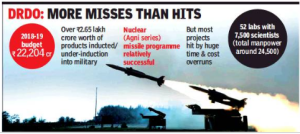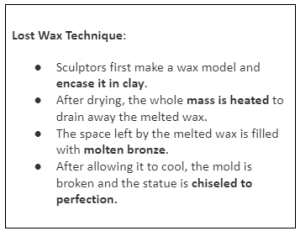Context:
- A high level committee has been established by the Defence Minister led by the former Principal Scientific Advisor to review the functioning of the Defence Research and Development Organization (DRDO).
More about the news:
- Redefining roles in defence domain: The committee is tasked with generating recommendations to review and redefine the department’s role and align it with India’s futuristic technological requirements in the defence domain.
- The future of warfare is likely to focus on emerging technologies that could change and potentially revolutionize the battlefield in four broad areas—connectivity, lethality, autonomy, and sustainability.
- Connectivity: The ways in which combatants detect and locate their adversaries, communicate with each other, and direct operations;
- Lethality: The damage that new weapons and weapon systems can inflict on battlefields;
- Autonomy: The ways in which robotics and AI can change who (or what) fights and makes decisions;
- Sustainability: The ways that militaries supply and support their deployed forces.
|
- Parliamentary Committee: In 2019, the Committee noted that the DRDO’s performance fell short of anticipated standards and emphasised the need for a significant restructuring of the organisation.
About Defence Research and Development Organisation (DRDO):
- It is the premier agency under the Department of Defence Research and Development in the Ministry of Defence of the Government of India.
- It is charged with the military’s research and development, headquartered in Delhi, India.
Formation:
- It was formed in 1958 by the merger of the Technical Development Establishment and the Directorate of Technical Development and Production of the Indian Ordnance Factories with the Defence Science Organisation.
Contribution:
- In March 2019, DRDO developed India’s first anti-satellite system that made India one of the space superpowers. In 2016.
- It successfully tested its first indigenously developed heavy-duty drone, Rustom 2, which is an unmanned armed combat vehicle developed on the lines of the US’s Predator drone.
- DRDO co-developed INS Arihant, India’s first nuclear ballistic missile submarine. Its self-ejectable black box for airplanes — BSAT — can help rescuers easily locate the debris in the event of a crash in water.
- DRDO has also developed several ballistic missiles under its Integrated Guided Missile Development Programme, which includes missiles like Prithvi, Trishul, Agni, Akash and Nag.
|
-
- During the period from January 2010 to December 2019, the organization concluded 103 mission mode (MM) projects which were terminated after incurring an expenditure of ₹2,505.23 crore.
- CAG Report: A report of the Comptroller and Auditor General (CAG) of India criticized the DRDO for categorizing 20 mission mode projects as ‘successful,’ despite not accomplishing their intended goals.
- Dr P Rama Rao Committee: Earlier, the DRDO established the committee to evaluate its operations. Although the DRDO endorsed all its suggestions, it did not implement the proposal to establish a Board of Research for Advanced Defence Sciences (BRADS).
Terms reference of the committee:
- Restructuring and redefinition: The objectives include a comprehensive restructuring and redefinition of the roles within the Department of Defence (R&D) and DRDO.
- State of the art collaboration: This entails refining their interactions with academia and industry. The aim is to boost involvement from academia, MSMEs, and startups in advancing state-of-the-art technologies.
- Setting Accountability mechanism: The plan involves creating incentives and disincentives within a project-based workforce system, ensuring accountability, and removing underperformers.
 Leveraging Expertise: The strategy incorporates leveraging the expertise of NRIs and foreign consultants, along with fostering international collaborations to drive the development of cutting-edge and disruptive defense technologies.
Leveraging Expertise: The strategy incorporates leveraging the expertise of NRIs and foreign consultants, along with fostering international collaborations to drive the development of cutting-edge and disruptive defense technologies. - Infrastructure Modernization: The initiative encompasses modernizing administrative, personnel, and financial systems to expedite project implementation.
- Streamlining of structures: There’s a focus on streamlining laboratory structures and enhancing the evaluation process for their performance.
Challenges with the functioning of DRDO:
- Working as a government PSU : The DRDO’s operational model resembles a government Public Sector Undertaking (PSU), which often regards the entire defence process – spanning research, development, and production – as its exclusive jurisdiction.
Other defence manufacturing organizations in India:
- Hindustan Aeronautics Limited (HAL): It is a Navratna Company, is the largest Defence PSU under the Department of Defence Production, Ministry of Defence, India.
- Bharat Electronics Limited (BEL): BEL, a Navratna Company, established in 1954 under MoD has nine Units across India. BEL has core competencies in the Defence sector in areas of Radars & Weapon Systems, Sonars, Communication, EWS, Electro-Optics and Tank
- Indian Ordinance factory: The Indian Ordnance Factories is the oldest and largest industrial setup forming an integrated base for indigenous production of defence hardware and equipment.
|
- Impeding defence acquisitions: It often impedes defense acquisitions by considering the entire process as its own domain rather than supporting the private sector and efficient hardware procurement.. Example, anti-tank guided missiles and unmanned aerial vehicles.
- Insufficient funding: Financial constraints have led to the scaling down of some major initiatives.
- It has received around 6% of the defence budget, in stark contrast to the generous funding provided to counterparts in the US and China.
- Inadequate production output: It was meant to promote indigenous weaponry manufacturing in India, but its production output has been low.
- This deficiency is clearly illustrated by India’s continued reliance on imports to fulfill most of its military requirements.
- India still imports 70 per cent of its defence equipment requiremen ts
- As per SIPRI Report, India remained the world’s largest arms importer for the five-year period between 2018-22.
- Substandard production: DRDO products frequently do not meet anticipated quality standards, resulting in dismissals by the armed forces.
- Armed forces have rejected 70 per cent of the products in the last 15 years because the products did not meet their standard.
- Project delays: Persistent delays plague DRDO projects, resulting in significant budget overages.
- These extensions were primarily attributed to frequent alterations in design specifications and delays in executing user trials and procurement orders.
- Among the 175 projects scrutinised by the CAG, two-thirds encountered challenges in meeting their scheduled timelines, necessitating extensions ranging from 16% to 500%.
- The HELINA, helicopter launched anti-tank missiles, with December 2010 as the deadline was finally tested successfully in 2022.
Way Forward:
- Defence R&D Council: The council comprising top military leaders and scientists should be the apex decision-making body with a focus on the capability development plans which are in line with the long-term integrated perspective plans (LTIPPS) of the services.
- LTIPPS covers a period of 15 years and it identifies the shape and size of the services over the designated time period based on foreseeable strategic trends
- Exclusive focus on research and development: The domain of defense production needs to be removed from DRDO’s scope and entrusted to the private sector.
 Synergy between DRDO and armed forces: The complete endorsement of DRDO by the armed forces is very crucial. They must provide clear direction and a well-defined vision regarding their requirements from DRDO.
Synergy between DRDO and armed forces: The complete endorsement of DRDO by the armed forces is very crucial. They must provide clear direction and a well-defined vision regarding their requirements from DRDO.- Joint ventures with select foreign manufacturers: To stimulate domestic private sector, collaborative ventures could be initiated to enhance manufacturing capacity.
- BrahMos Aerospace and Multirole Transport Aircraft Ltd are the joint ventures between DRDO and Russia.
- Decommissioning of redundant projects: By discontinuance of redundant DRDO labs and projects, substantial physical assets could be unlocked and repurposed to establish a fund specifically designated for fostering innovation.
News Source: Hindustan Times
![]() 26 Aug 2023
26 Aug 2023
 Leveraging Expertise: The strategy incorporates leveraging the expertise of NRIs and foreign consultants, along with fostering international collaborations to drive the development of cutting-edge and disruptive defense technologies.
Leveraging Expertise: The strategy incorporates leveraging the expertise of NRIs and foreign consultants, along with fostering international collaborations to drive the development of cutting-edge and disruptive defense technologies.  Synergy between DRDO and armed forces: The complete endorsement of DRDO by the armed forces is very crucial. They must provide clear direction and a well-defined vision regarding their requirements from DRDO.
Synergy between DRDO and armed forces: The complete endorsement of DRDO by the armed forces is very crucial. They must provide clear direction and a well-defined vision regarding their requirements from DRDO.